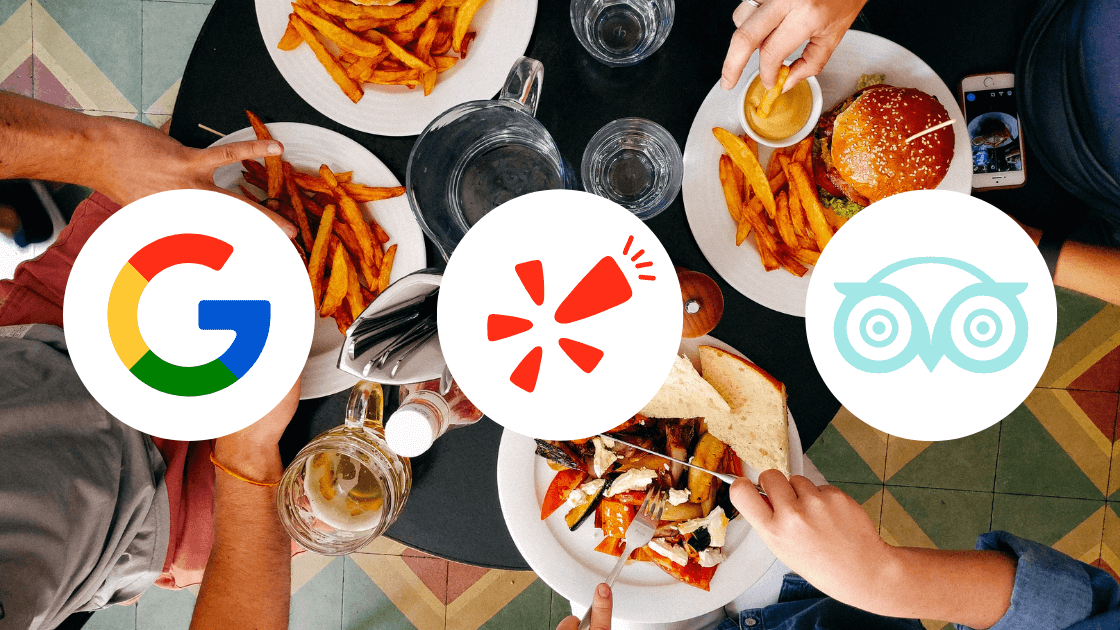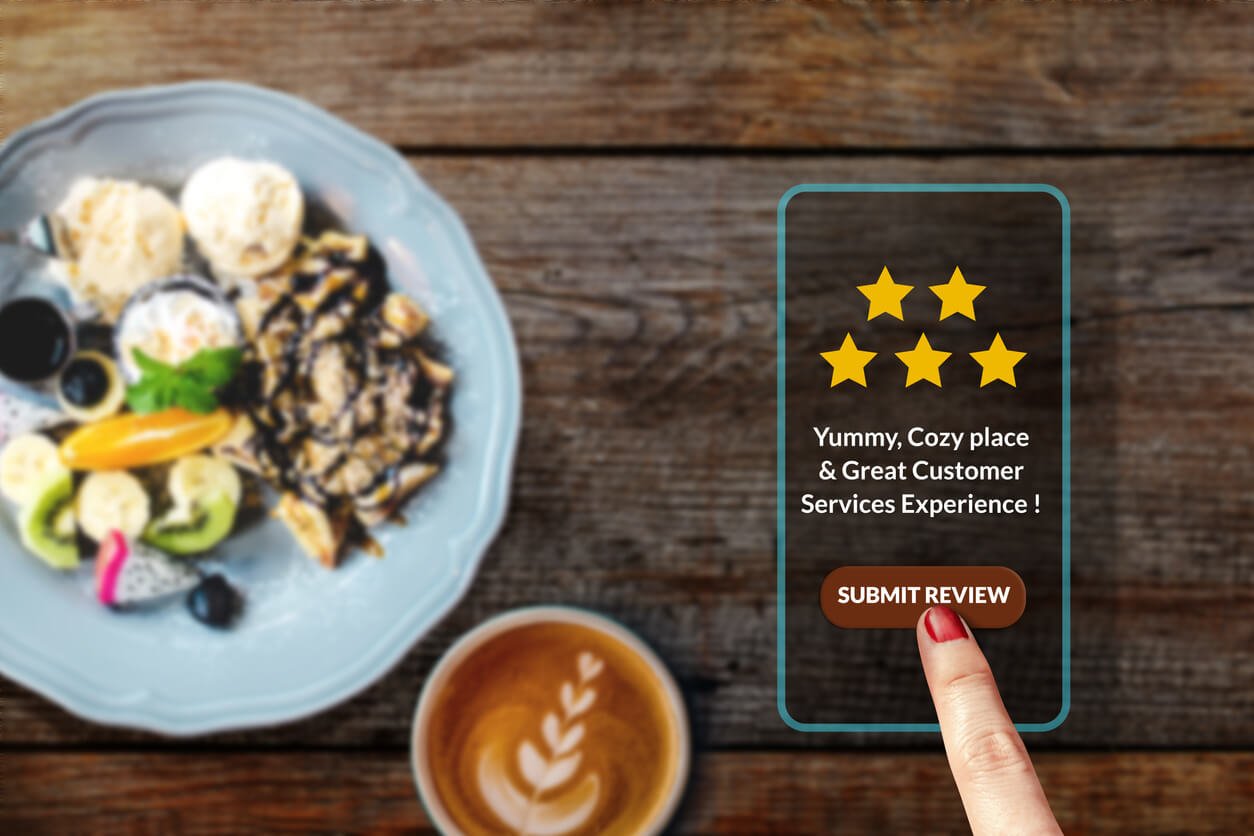How to Unlock Restaurant SEO Success: A Comprehensive Guide
Restaurant SEO — while it may seem this complicated...
It doesn't need to be!
Now if you're here, you probably:
-
Just started to explore search engine optimization for restaurants
-
Tried some SEO "recipe" in the past but are still struggling to see results
-
Do SEO, but want to kick your restaurant's search engine visibility up a notch
There's one thing we need to get out of way first and that is: restaurant SEO isn't a fast hack to success.
As a restauranteur or someone who works on a restaurant leadership team, you know how that growing a successful and sustainable brand takes time.
Restaurant SEO is no different. It helps lay a foundation for your online success. While you may not see quantifiable results overnight, you'll reap the benefits over time. It's like cooking low and slow.
That might be hard for some folks to stomach. We've all grown accustomed to instant gratification and near-immediate results. So why's this important?
Because even though you might have the most mouthwatering menu and a stunning ambiance, if your online presence isn't up to par, you're missing out on a massive opportunity for people to find you.
In today's digital age, having a strong online presence and a solid restaurant SEO strategy is crucial for success. In this post, we'll guide you through the ins and outs of restaurant SEO, from local optimization to content marketing and link building techniques. Get ready to unlock the full potential of your restaurant's online presence and watch those reservations roll in.
Short Summary
-
Unlock restaurant SEO success by utilizing local SEO strategies and optimizing your Google Business Profile.
-
Increase website visibility through content marketing, link building, and monitoring performance with Google Search Console and Analytics.
-
Maximize ROI by encouraging customer reviews, implementing on-page essentials, and creating a mobile friendly online presence.
The Power of Local SEO for Restaurants

Your restaurant's success must include local SEO. You might be wondering, what is local SEO?
Simply put, it's the process of optimizing your restaurant's online presence to rank higher on search engines, making it easier for potential customers to find you. In the restaurant industry, local SEO is essential for both in-person dining and take-out options, as it can help you increase visibility and attract more customers.
Did you know that effective restaurant SEO can drive hundreds if not thousands of potential customers to your restaurant every month? The COVID-19 pandemic changed the restaurant industry. Restaurants that were discoverable and accessible through organic searches saw a great benefit. In fact, nearly 68% of the total clicks and over 53% of all website traffic that a restaurant is likely to receive are from organic searches.
By focusing on optimizing your website, establishing a solid presence on online listings, and crafting content strategically, you'll be well on your way to maximizing your search engine optimization efforts.
Optimize Google Business Profile
One of the most effective ways to improve your restaurant's local SEO is by optimizing your Google Business Profile (GBP), formerly known as Google My Business. Claiming and setting up your restaurant's GBP is the perfect way to start improving your Google exposure.
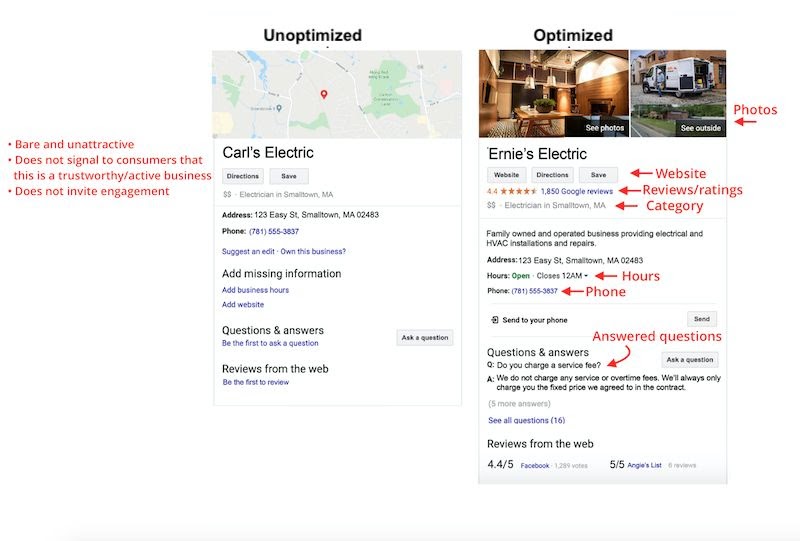
Including up-to-date images and videos of the food and experience, listing the hours, providing links to your website and online ordering, and selecting the correct category will set your restaurant up for success.
(FYI, even though Google takes the lion's share of searches, you can also claim and optimize your Apple Business Connect profile. It's free traffic, after all!)
Generate Positive Reviews
Positive reviews can significantly impact your restaurant's success. In fact, research shows that positive reviews can boost restaurant sales by 5-9%. Furthermore, 68% of restaurant goers said they visited a new restaurant entirely based on positive online reviews.
To generate more positive reviews, consider incentivizing customers by offering additional discounts or offers. Or, and this might sound crazy, but you can...
Simply ask!
Easily get your restaurant 4x more reviews
Watch your restaurant grow in reviews, traffic, and sales with NiceJob's set-and-forget review generation software.
Learn more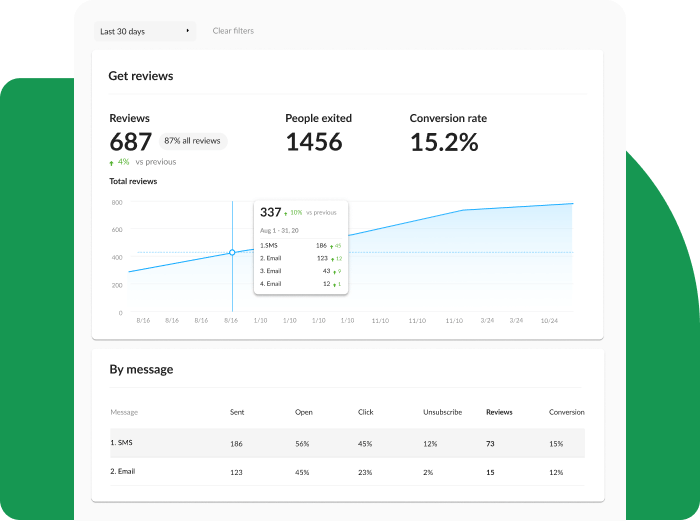
Proactively responding to reviews is another important aspect of managing your restaurant's online reputation. When you engage with both positive and negative feedback, you not only protect your business from potential harm, but also maximize sales and foster customer loyalty.
Remember, online reviews can make or break your restaurant's reputation, so it's crucial to prioritize and manage them effectively.
Utilize Local Directories
Apart from optimizing your Google Business Profile, it's important to use local directories to further boost the local SEO or your restaurant business. Local directories like Yellow Pages are great ways to help potential customers discover your restaurant.
By enrolling in these directories, you can increase your visibility and gain more credibility. Focusing on Google Business Profile, TripAdvisor, Foursquare, CitySearch, various yellow pages, and other emerging niche review websites will help you maximize your local SEO efforts.
To optimize your presence in local directories, focus on refining your business description and categories to match the keywords you identified in your keyword research.
Additionally, keeping your NAP (name, address, phone) information consistent across all data sources is essential to ensure that correct information is displayed, helping Google trust your business information and boost its ranking.
Add Schema Markup to Your Website
Admittedly, this is a more technical part of restaurant SEO. But depending on where you host your website, there are helpful tools that can take care of this for you.
For example, if your restaurant business site lives on WordPress, you can use plugins such as Yoast SEO or AIO (All In One) SEO.
Schema markup is another powerful tool that can help boost your restaurant's visibility and attract more customers. This structured data can significantly improve your restaurant's position and ranking in search results, making it more likely to appear in a local map pack or as a featured snippet.
Featured snippets are a great way to boost your restaurant's visibility and attract more customers, as they appear above other organic results and have a higher click-through rate.
Providing content in a structured and succinct manner and optimizing your Google Maps listing helps ensure that your restaurant stands out in a sea of competitors.
On-Page SEO Essentials for Restaurant Websites
On-page SEO, also known as on-site SEO, is a critical component of your restaurant's online success. It involves optimizing various elements of your website, such as:
-
Keyword research and implementation
-
Meta tags and descriptions
-
Image optimization
Keyword Research and Implementation
Conducting effective keyword research is vital for your restaurant's SEO success. By identifying the keywords that you want your restaurant to rank highly for, you can create content that resonates with your target audience and increases your website's chances of being found on search engines.
To get the most out of your keyword research, you should see what your restaurant competition is doing as well as consider using free or paid tools like Google Keyword Planner, SEMrush, and KWFinder.
If you're an authentic Hakka restaurant in your city, you don't want to include non-Hakka keywords on your website. Instead, focus on including terms like:
-
Authentic Hakka restaurant
-
Authentic Hakka restaurant in [location]
-
Best Hakka food in [location]
Once you've identified the right keywords, it's time to integrate them into your website content. Make sure to include your targeted keywords in your web pages' titles, headings, and meta descriptions, as well as in the body of your content and image alt attributes.
By strategically implementing these keywords throughout your website, you'll be well on your way to boosting your restaurant's SEO performance.
Meta Tags and Descriptions
Meta tags and descriptions play a crucial role in your restaurant's on-page SEO. These HTML elements provide search engines with valuable information about the content of a web page. By optimizing your meta tags and descriptions, you can improve your website's ranking on SERPs and increase its visibility to potential customers.
To optimize your meta tags and descriptions, ensure that they are concise, informative, and include your targeted keywords. Title tags should be ideally around 55 characters long. Meta descriptions should usually be between 155 and 165 characters.
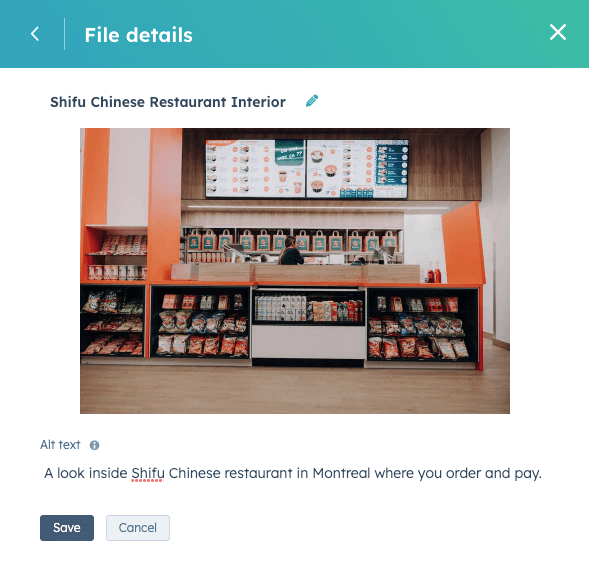 As a best practice, you should also be clear and concise with your page titles and descriptions like in the image above. These should tell search engines engines exactly what visitors can expect to find on your website.
As a best practice, you should also be clear and concise with your page titles and descriptions like in the image above. These should tell search engines engines exactly what visitors can expect to find on your website.
Going with the Hakka example, your page title could be "Montreal's Authentic Hakka Restaurant | Your Restaurant Name. Your page description could be "Enjoy some 5-star Hakka food at Restaurant Name in the heart of Downtown Montreal. We can't wait to serve you!"
By adhering to these best practices, you can boost your website's SEO performance and attract more customers to your restaurant.
Image Optimization
Image optimization is essential for improving the loading speed and user experience of your restaurant website. By compressing and resizing images, you can ensure a smooth and enjoyable user experience, as well as faster website loading speeds.
Image optimization involves choosing the right file type, optimizing alt attributes, and ensuring that images are properly sized and scaled for the device they are being displayed on.
In addition to improving site speed, optimized images can also enhance your website's SEO performance. Incorporating descriptive file names and alt attributes that include your targeted keywords helps boost your website's visibility on search engines and attracts more customers to your restaurant.
You can also improve the visibility of your restaurant's images ranking on search engine results pages (SERPs) by giving them clear titles and descriptions.
For example, you can title an image of your storefront "Restautant-Name-Hakka-Exterior" and an indoor image "Restaurant-Name-Hakka-Interior". Follow this same pattern for images of specific meals, for example, "Restaurant-Name-Hakka-Full-Dish-Name".
Building a Mobile-Friendly Online Presence That Search Engines Love
With the majority of users accessing the internet through mobile devices, it's more important than ever for restaurants to have a mobile-friendly online presence.
In fact, research shows when people visit a mobile-friendly site, 74% say they're more likely to return to that site in the future and 67% say they're more likely to buy a site's product or service.
Building a mobile-friendly online presence involves implementing responsive web design and optimizing site speed for the best user experience on mobile devices. In addition to responsive web design, site speed optimization ensures that your website loads quickly on mobile devices, providing a seamless user experience and improving your website's SEO rankings.
Responsive Web Design
Responsive web design is a powerful approach to ensuring that your restaurant's website looks great and performs optimally on all devices, from smartphones to tablets and desktop computers. By leveraging flexible grids and layouts, images, and CSS media queries, responsive web design can adjust to different screen sizes, platforms, and orientations, providing an improved user experience and better SEO rankings.
To create a responsive website, consider taking a mobile-first approach, optimizing images for different devices, and testing the website on multiple devices and browsers for the best results. By implementing responsive web design, you'll ensure that your restaurant's website is accessible and enjoyable for users on any device, ultimately leading to increased traffic and more satisfied customers.
Site Speed Optimization
Site speed optimization is crucial for your restaurant's mobile-friendly online presence. A fast-loading website not only provides a better user experience, but also improves your website's SEO rankings. To optimize your site speed, consider implementing techniques such as image optimization, using cache tools, and minifying CSS/JavaScript code.
Achieving a site speed of three seconds or less is the ideal for technical SEO. By focusing on site speed optimization and implementing the best practices mentioned above, you can ensure that your restaurant's website loads quickly on mobile devices and provides a seamless user experience, ultimately leading to increased traffic and more satisfied customers.
Thankfully, the most popular and trusted website builders will make sure yours is mobile-friendly and responsive by design!
Win 10% or more website sales — or it’s free!
Grow your business with the best done-for-you website builder for small business owners. It’ll be the last you ever need.
Learn more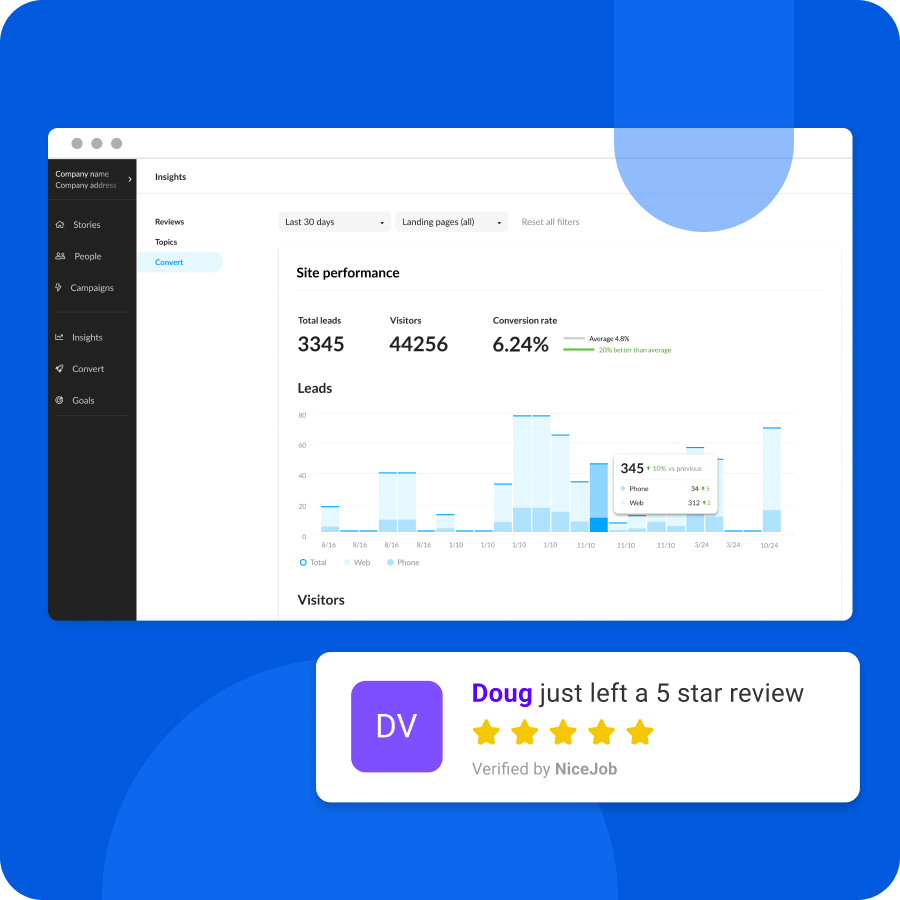
Local Content Marketing Strategies for Restaurants
Local content marketing is a powerful tool that can help restaurants establish authority, engage customers, and drive more traffic to their websites. By leveraging various content marketing strategies, such as blogging, social media, video, and podcasts, you can create compelling content that resonates with your target audience and improves your website's SEO performance.
Blogging, Vlogging, Social Media, and Podcasts
Blogging and social media are essential components of any successful content marketing strategy for restaurants. Regularly posting informative and engaging content on your restaurant's blog can help improve your website's SEO performance and attract more customers.
Additionally, actively engaging with fans and strategically promoting content on social media platforms can help drive even more traffic to your website.
Not sure what to share? Try some of these ideas:
-
Chef's Tuesday Tips that go out to your restaurant's email list every week
-
Film your bartender's making cocktails one night and share the recording and ingredient list
-
Leverage your five-star Google restaurant reviews and turn them into reputation marketing posts for Instagram
To make the most of blogging and social media for your restaurant, ensure that the content you create is relevant, engaging, and shareable. Include social media buttons on your blog posts to encourage sharing and consider creating a dedicated hashtag for your restaurant to increase visibility on social platforms.
Video and podcasts also offer unique opportunities for restaurants to create engaging content that captivates their audience. It might not make sense for every restaurant owner to start a high-production video or podcast project.
Even with a phone from the last couple of years, you can create amazing behind-the-scenes or live content! To create engaging video and podcast content, consider repurposing existing video and audio content or collaborating with industry influencers to produce fresh, engaging content that appeals to your target audience.
And if you can't or don't want to start your own, you can be a guest on other food and beverage or hospitality-related podcasts. This is a great way to build your restaurant's brand awareness.
So, start using content marketing for your restaurant, consider creating a content marketing plan that outlines your goals, target audience, and the types of content you plan to create. Once you have a solid plan in place, you can begin producing high-quality, engaging content that not only attracts more customers but also establishes your restaurant as an authority in the industry.

Link Building Techniques for Restaurant SEO
Link building is a powerful SEO technique that involves getting other websites to link to your restaurant's website, helping to build credibility and drive more visitors to your site. Effective link building techniques for restaurants include collaborations and influencer partnerships, guest posting, and outreach. By leveraging these techniques, you can not only improve your website's search engine rankings, but also establish your restaurant as an authority in the industry.
To get started with link building for your restaurant, consider reaching out to industry influencers, local bloggers, and other websites with high domain authority to request collaborations or guest posting opportunities. Additionally, actively monitor and respond to online reviews and engage with your audience on social media to foster relationships and encourage others to link to your website.
Collaborations and Influencer Partnerships
Collaborations and influencer partnerships can be incredibly beneficial for your restaurant's link building efforts. By partnering with social media influencers or other businesses in the food industry, you can promote your restaurant's brand or products and secure valuable backlinks to your website.
To maximize the benefits of collaborations and influencer partnerships, make sure to set clear goals for the partnership and establish a plan for promoting the collaboration on both your restaurant's website and the influencer's platform. By doing so, you'll increase your brand visibility, drive more traffic to your website, and strengthen your domain authority with links to trusted sources.
Guest Posting and Outreach
Guest posting and outreach are another effective link building technique for restaurants. When you create valuable content for other websites with higher domain authority, you can secure high-quality backlinks to your website, increase your brand visibility, and drive more visitors to your restaurant.
To ensure the success of your guest posting and outreach efforts, focus on creating high-quality, engaging content that is relevant to the target audience of the websites you're collaborating with.
Additionally, make sure to properly attribute your content and ensure that any external links are of the highest quality. Doing this will not only improve your website's SEO performance, but also establish your restaurant as an authority in the industry.
Monitoring Your Restaurant Website Performance and Growth
Monitoring your restaurant's performance and growth in search engines is crucial to track progress and maximize your return on investment (ROI).
Google Search Console and Analytics
Google Search Console and Google Analytics are powerful tools that can help you monitor your restaurant's SEO performance and growth. Google Search Console enables you to check, trace and solve any matters related to your site's visibility in Google search results.
You can depend on it to keep your website visible and prominent. Additionally, Submitting your website's sitemap to Google Search Console also helps Google easily navigate your website and increase your SEO potential.
Google Analytics, on the other hand, allows you to track website activity and measure important metrics such as bounce rate, session duration, and user engagement.
By utilizing these tools and monitoring your website's performance regularly, you can identify areas for improvement and continuously optimize your restaurant's SEO strategies.
Conversion Tracking
Conversion tracking is an essential tool for measuring the success of your restaurant's SEO efforts. By monitoring and measuring the number of goal completions on your website, you can gain valuable insights into what meaningful actions are completed by visitors after interacting with your ads or content.
A company goal, or "conversion event" as Google Analytics calls it, will look different from restaurant to restaurant. You might even have multiple goals or actions that people can complete on your website that you care about, including:
-
Bookings
-
Phone calls
-
Menu clicks and more
Armed with this information, you can pinpoint which campaigns are most successful and use that data to optimize your website, ultimately maximizing the potential of your restaurant's online presence.
Order's up
In conclusion, optimizing your restaurant's SEO is crucial for driving traffic, boosting visibility, and attracting more customers from the search results.
By focusing on local SEO, on-page essentials, building a mobile-friendly online presence, utilizing content marketing strategies, and implementing link building techniques, you can unlock the full potential of your restaurant's online presence.
Remember to monitor your SEO performance and growth regularly to ensure continuous improvement and success. With a solid SEO strategy in place, your restaurant's online presence will flourish, and you'll be well on your way to becoming an industry leader who dominates the search results in your food niche.



